Did you know that patients visit at least two hospital websites before converting?[1] Unlike the impulsive “best pizza in downtown” search query, where users order any mouth-watering pizza right away, healthcare decisions are well-researched.
Because patients often browse for weeks, researching options before booking. And nearly half take over two weeks before picking a clinic.[1]
The question is, how to make sure your website is there for them when they’re ready? How do you ensure it is YOUR clinic that users pick from the dozens of others they have probably noted down? How do you even make it into their list?
This is where healthcare SEO can help.
Today, we bring you the top 15 result-oriented healthcare search engine optimization (SEO) tips to help you rise in SERPS, quickly beat your competition and fill up your practice schedule for months.
Top 15 Tried and Tested Healthcare SEO Tips Bound to Convert Patients

1. Start Thinking Like Your Patients
Studies show that 77% of patients research healthcare providers online before booking appointments.[1] This is a lot of opportunity if you manage to convert even a handful of them.
So, where do you start? You begin by imagining a patient experiencing a specific health concern. What words would they type into a search engine? Will they directly look for a treatment, or would they want to know more about their health condition first?
Let’s look at an example:
Patient: Imagine Sarah is experiencing persistent stomach pain. Initially, her search might be broad:
- Initial Search Query: “Stomach ache”
This broad search returns generic information about indigestion (screenshot below).
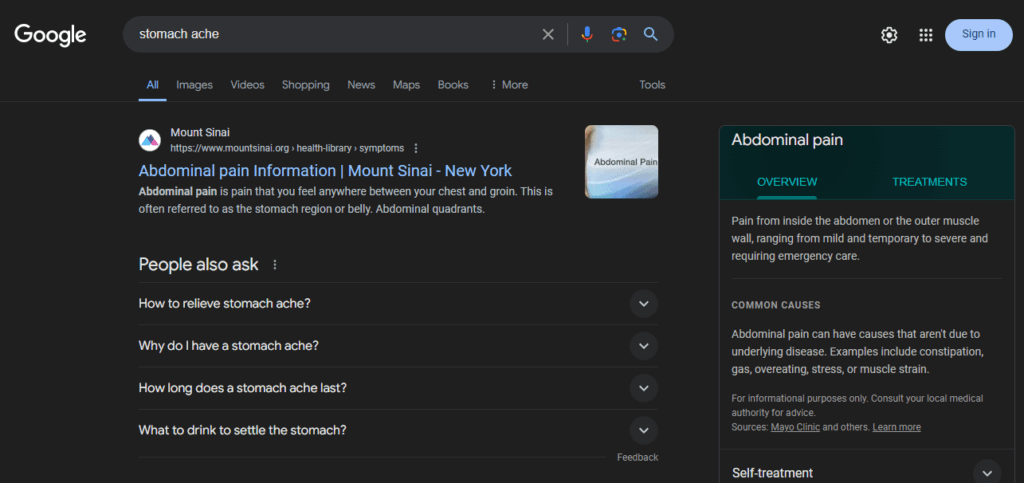
But Sarah, looking for something more specific, refines her search based on her symptoms and gets more focused SERPs for each query:
- Refined Search 1: “Stomach ache after eating greasy food”
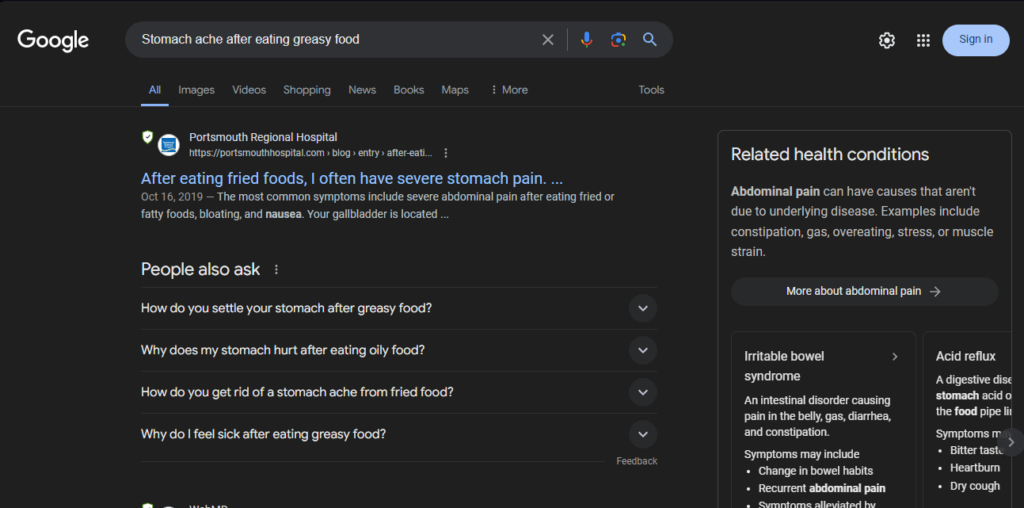
- Refined Search 2: “Sharp pain in the upper right abdomen”
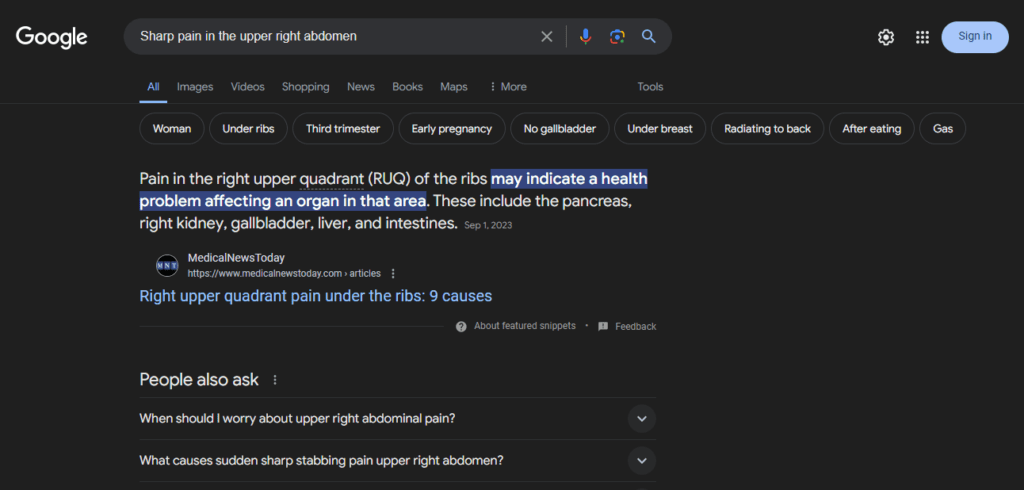
These refined searches are more likely to lead Sarah to information about specific conditions like heartburn or gallstones. Similarly, a caregiver searching for solutions for elderly incontinence might refine their query from “incontinence issues” to “best incontinence products for elderly men,” helping them find tailored solutions.
If you are still lost, perform a search query yourself. The moment you type in a health condition, Google automatically pulls out relevant searches underneath. These are some of the related queries for which you can create content.
Obviously, you can not Google every other search query, so we have an easier way of doing that.
Pro-Tip: If you have content that effectively and efficiently answers user search intent, Google will automatically rank you for it. You will just have to implement all these healthcare SEO tips on your website.
2. Target Search Terms Your Patients Use to Find Healthcare Providers
Fortunately, there is a quicker way of getting inside your patients’ minds. Tools like Ahrefs, Ubersuggest, and SEMrush are specifically designed to do this SEO keyword research for you. Just type in the keyword you want the data for, and you will get it.
But here is the catch. Instead of focusing on broad keywords like “dermatologist,” target long-tail keywords with location specificity. For instance, “pediatric dermatologist near me” or “eczema treatment for children in [your city].”
This laser focus on patient intent will attract qualified leads actively seeking your services.
Pro-Tip: When performing keyword research, use the SEMrush filter feature to narrow down low-competition keywords. Then, switch to the questions section and start creating content from the lowest keyword difficulty to higher ones (see the image below). Also, analyze your competitor’s keywords to see what terms they rank for and identify opportunities to differentiate yourself.
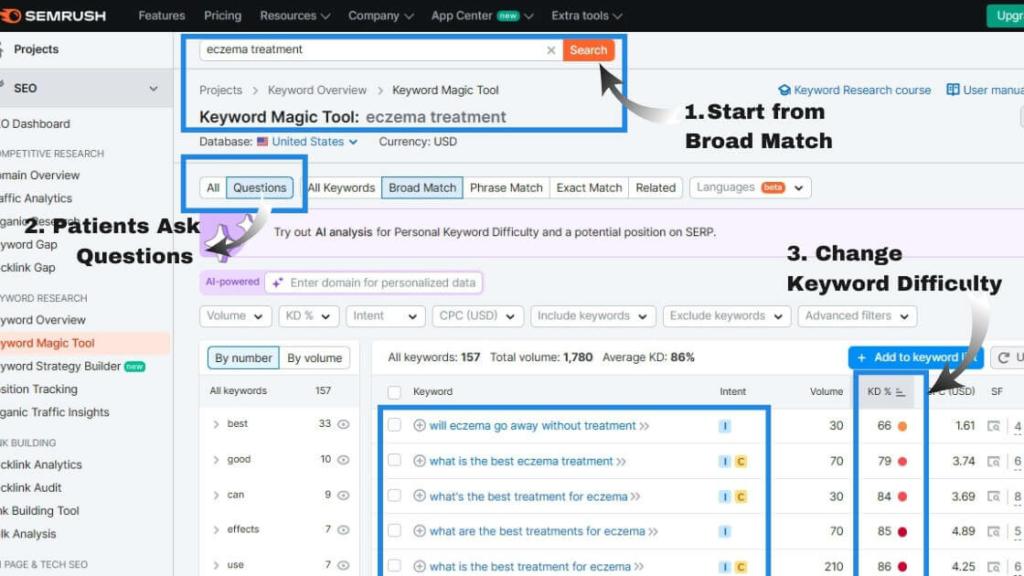
3. Learn More About Medical Industry Limitations When Generating a Safe Copy
Healthcare SEO requires understanding the limitations of medical information online; you can not just start telling your patients how to perform any treatment at home. So always keep patient safety first, ensure your content adheres to HIPAA regulations, and avoid misleading information.
Here, partnering with a medical content writer familiar with SEO best practices and HIPAA compliance becomes a smart investment. They can create informative content that educates patients without venturing into risky medical advice territory.
Pro-Tip: Search for your competitors or your healthcare niche industry giants and see what type of content they are generating. You will have a fair idea of what makes online medical content safe, HIPAA-compliant, and low-risk.
4. Create Authentic Content That Answers User Intent and Enhances User Experience
Now that you know what keywords to target and how to make your content safe, it is time to focus on the “why” behind patient searches. What questions do they have? What information are they seeking?
Instead of a generic overview of a particular condition, you need to create content that directly addresses patient concerns. Answer their questions in a clear, concise, and informative way. Aim to produce high-quality content that provides value, builds trust, and keeps patients engaged on your website — a crucial factor in Google’s algorithm.
Pro-Tip: Use a question-answer format to target long-tail keywords and address patient concerns directly. Look at patient reviews on your Google My Business (GMB) profile and social media pages to identify common questions and topics. Create blog posts or FAQ sections around that.
5. Ensure You Build a High EEAT Around Your YMYL Medical Content
We have already hinted that healthcare-related content is difficult to rank with serious limitations on what you can say, but why is it so? It isn’t just about HIPAA guidelines; it is also about one of the major Google algorithm updates, namely EEAT and YMYL.
Experience, Expertise, Authoritativeness, and Trustworthiness, aka EEAT, is a crucial factor of Google’s Search Quality Evaluator Guidelines and mainly affects Your Money or Your Life (YMYL) content.
Since medical content significantly impacts a reader’s wellness & well-being, mental health, and money-related decisions (YMYL), Google takes additional steps when ranking (and penalizing) medical websites for it.
The question is, how do you build a strong EEAT profile to improve your healthcare SEO?
The answer is straightforward.
- Ensure your content is created by licensed medical professionals.
- Highlight accreditations and affiliations with reputable organizations.
- Encourage patients to leave positive reviews on Google My Business and other relevant platforms.
Here is a screenshot from Forbes Health showing a blog on diabetes — a perfect demonstration of healthcare SEO tips 3, 4 and 5 when put together.
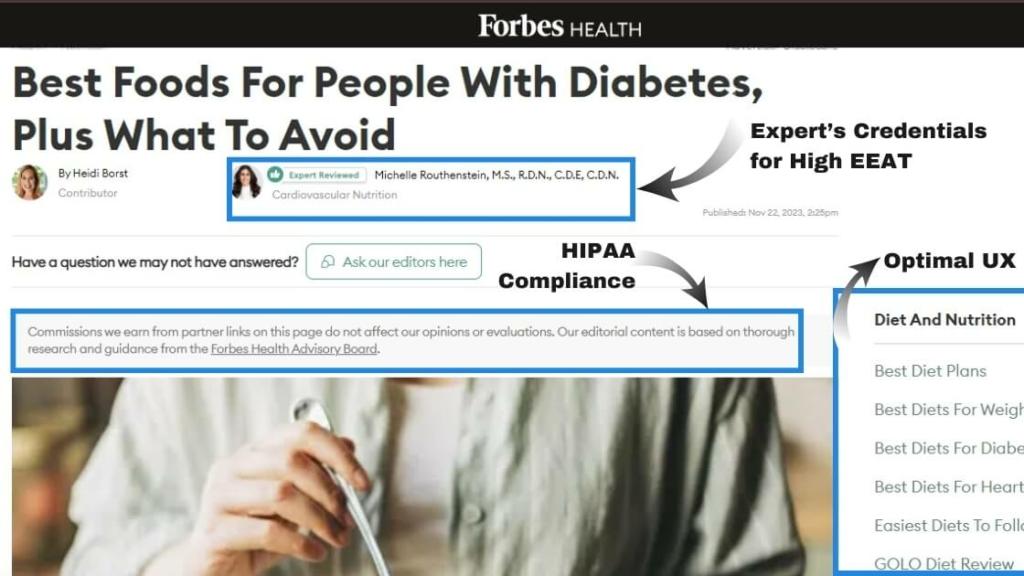
Pro-Tip: Encourage patient reviews on Google My Business and other platforms like Healthgrades or Zocdoc. Respond to both positive and negative reviews promptly and professionally. Showcase your team’s qualifications on your website by including bios with their educational background, certifications, experience in healthcare, and professional affiliations.
6. Make Your Website Design Intuitive for Fast Navigation
You have your website populated with the right content that is optimized with your desired keywords; now what? It is time to switch your attention to your website design with the aim of reducing friction between continuous site sessions.
Imagine a patient in distress trying to find information on your website. A cluttered or confusing layout will only frustrate them, forcing them to leave your website and go to your competitors.
This is why you need to prioritize user experience (UX) with a clear and intuitive website design. You can use simple navigation menus with clear labels and a logical site structure that allows patients to find the information they need quickly and easily. This not only improves patient satisfaction but also sends positive signals to search engines for better ranking.
The best example? Take the NHS homepage, one of the UK’s top healthcare providers.
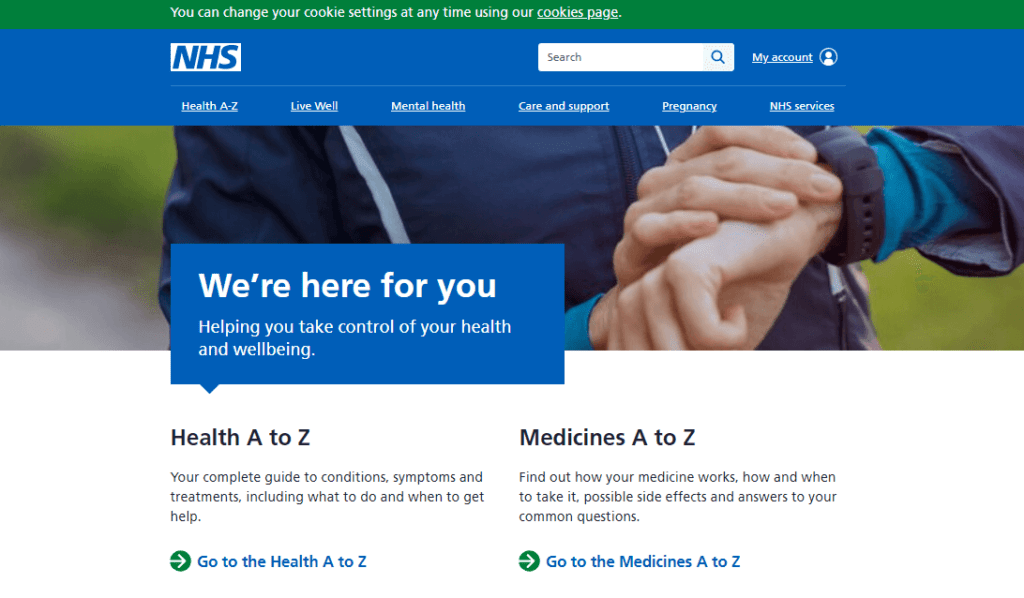
Pro-Tip: Conduct user testing with real patients to identify any navigation pain points. Use heatmap tools to see how visitors interact with your website and identify areas for improvement. Prioritize clear and concise menus with easy-to-understand labels and contrasting background color.
7. Use Easy-to-Understand, Short but Logical URLs
URL slugs or Permalinks can go unnoticed in a successful web session, but their impact on healthcare SEO is significant. Search engines and users alike appreciate clear and concise URLs.
Instead of generic alphanumeric strings that do not tell users which webpage they are going to, you should use descriptive URLs that reflect the content of the page. For example, instead of “/page123.html,” use “/dermatology/acne-treatments”.
This makes it easier for patients to understand what a page is about and helps search engines understand your website’s hierarchy.
Pro-Tip: Implement a consistent URL structure for your website. For example, all blog posts could follow a format like “/blog/post-title” or may directly go after your top-level domain (TLD). For a better UX, you can have multiple categories in the primary menu. Whatever URL structure you prefer, ensure it has a click depth of not more than three clicks. If there is any page beyond that, better move it under some category or create a different page for it.
8. Use High-Quality & Real-Time Images of Your Staff, Clinic, and Equipment
Ever visited a healthcare website only to see a person who seems more of a model than a real patient?
Generic stock photos can portray an inauthentic image of your clinic. A quick reverse image search might reveal the source, raising doubts about your practice. Focus on real patient experiences to build trust and avoid negative reviews to maintain patient volume.
If you have to, only include real, professional photos of your staff showcasing their friendly and approachable demeanor. Here is a good example of a chiropractic website with the practitioner image on the homepage.
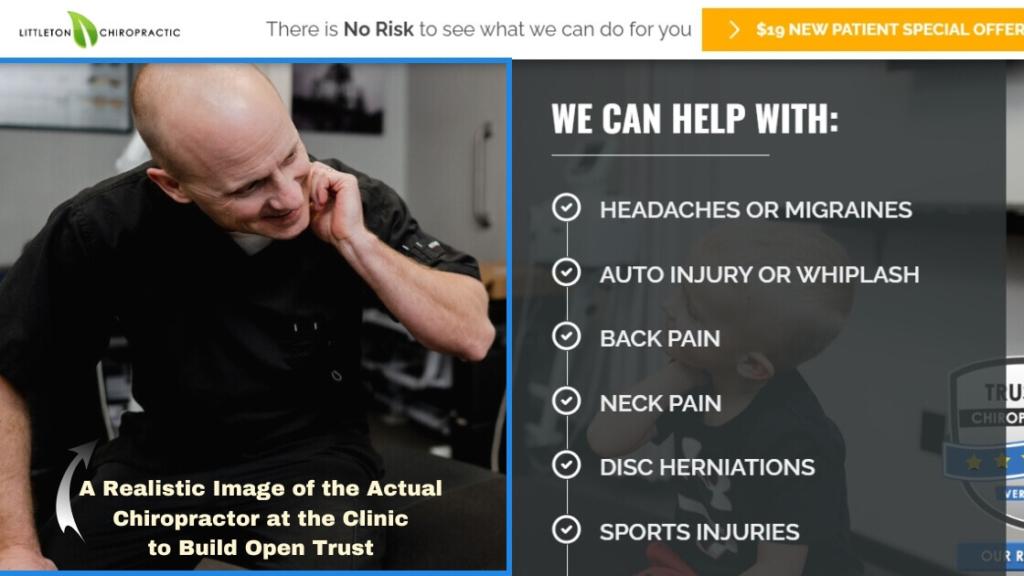
Consider featuring state-of-the-art equipment to demonstrate your commitment to providing high-quality and reliable care.
Pro-Tip: Almost every healthcare provider resorts to using iStock, Shutterstock, and Adobe images. These make your site look cheap and differentiate nothing. So invest in professional photography to capture high-quality images of your staff, clinic, and equipment. Also, use Webp format and never over-compress the images.
9. Include a Patient’s ‘Before & After Experience’ to Build Open Trust
We have talked about still images of your practice on your clinic website; how about something even more realistic and helpful to healthcare SEO?
Yes, studies show people are way more likely to convert after watching hospital videos, especially ones featuring patient testimonials.[1] Imagine potential patients seeing someone just like them (consider Proback’s patient testimonials below) overcome a similar struggle with YOUR help!
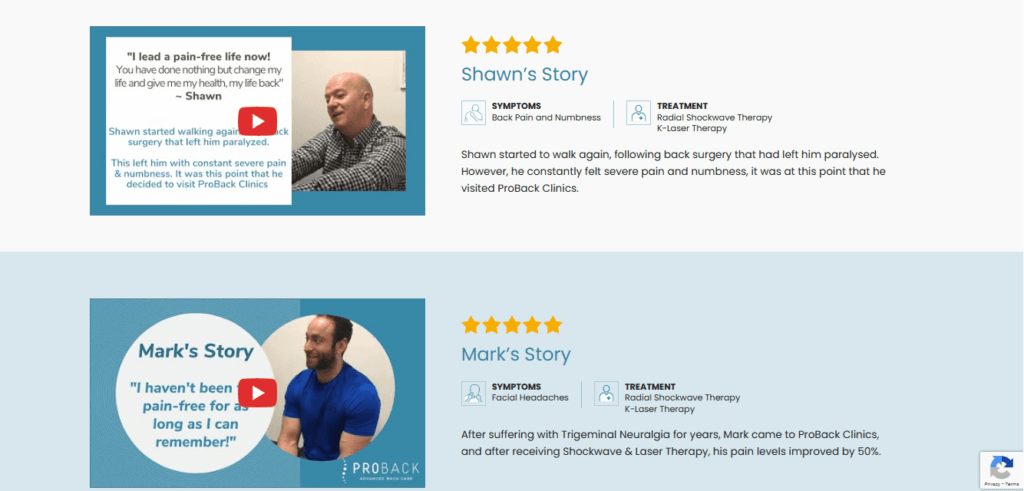
Talk about trust and social proof—that’s the good stuff that gets people booking appointments, and maybe even lands you a Google rich-snippet with a powerful testimonial!
Pro-Tip: Obtain written consent from satisfied patients to feature their success stories on your website. Anonymize their identity if necessary, but showcase the positive outcomes of your treatments. Consider including video testimonials for an even more impactful approach.
10. Don’t Forget the On-page, Off-page & Technical SEO Aspects
Most of the UX and UI-related stuff we have talked about goes under the on-page SEO section. These healthcare SEO hacks like high-quality content, clean user interface, clear menu labels, and intuitive site navigation can easily be done by a content writer with a good grip on web development and CMS.
While on-page SEO (website content and structure) is crucial, you shouldn’t neglect off-page SEO services (building backlinks from reputable websites) and technical SEO (website health and performance). When building a content plan for your website content, also add a separate plan in parallel to execute off-page SEO and have the technical department regularly audit site performance.
Pro-Tip: Utilize a website audit tool like SEMrush or Ahrefs to identify technical SEO issues on your website. Address problems like slow loading times, broken links, and mobile-friendliness. If you want, we have our online tutorials available to guide you through basic and advanced technical SEO fixes. For a comprehensive approach to optimizing your site, explore our on-page SEO services that ensure your website performs at its best and ranks higher.
But hey, if you still feel like seeing On-page, Off-page, and Technical SEO in action, take this SEO Fundamentals Accelerator Session to become a pro at it!
11. Always Adhere to Google’s White Hat SEO Guidelines
You may have heard about pages being ranked in a matter of days and would probably want your healthcare website to achieve the same, right? What you haven’t heard about is how fast Google is in penalizing them.
These are called Black hat SEO tactics like keyword stuffing or buying backlinks that may seem like shortcuts, but they ultimately harm your website’s reputation and ranking.
A good healthcare SEO agency would always adhere to Google’s Webmaster Guidelines when doing healthcare SEO for you. They focus on long-term organic growth strategies like creating valuable content, building trust with patients, and earning backlinks naturally.
If you haven’t come across one already, here is how to choose an SEO company.
Pro-Tip: We know it can be really difficult to rank your content in the beginning when your domain authority is low. But instead of buying backlinks, consider guest posts and op-ed article submissions to reputable platforms. Find medical bloggers who specialize in reviewing healthcare providers and ask them to provide an honest review about your clinic.
12. Ensure Your Website Health is Optimal
Just like patient health, website health is vital for success. Regularly monitor website performance using tools like Google Search Console. Address issues like slow loading times, broken links, and mobile-friendliness.
If you have a premium SEMrush or Ubersuggest account (which you should), run a website audit (like the ones below we have run for NUOPTIMA) and focus on correcting ‘errors’ in your website.
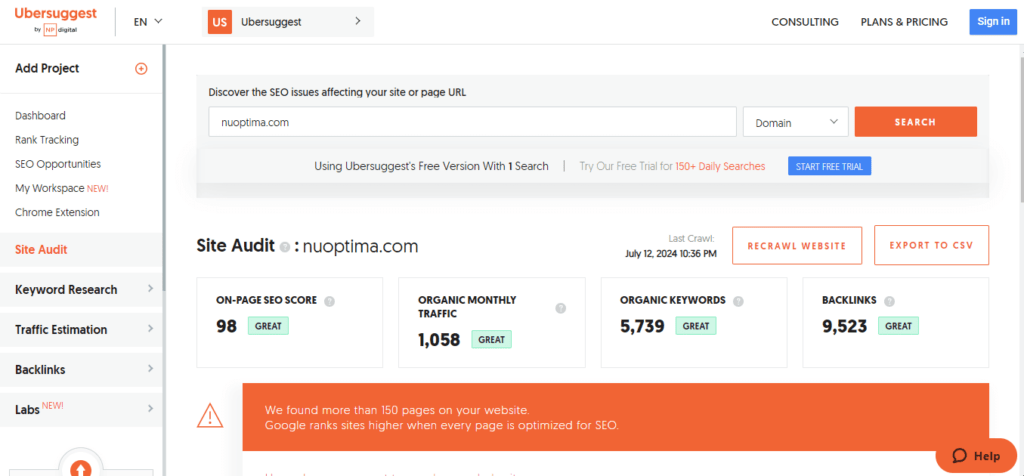
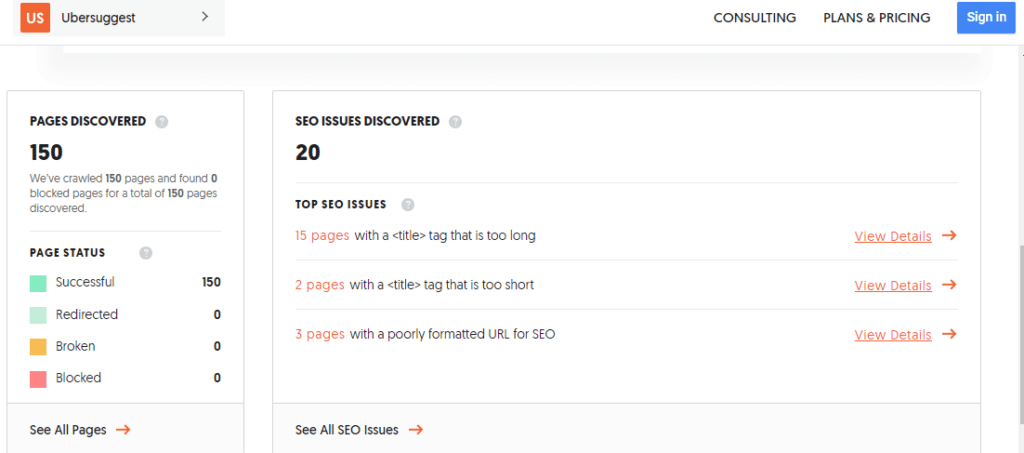
The audit report typically includes indexing errors, title tag issues, broken links, 404 pages, and much more. Also, start by creating an accelerated-mobile-page (AMP) version of your website for mobile users. Try keeping page load times less than two seconds, as 40% of consumers would leave your website if it does not load in less than three seconds[2]. Even Ubersuggest has put the yellow and red markers at 2.5 and 4 seconds, respectively (see the screenshot below).
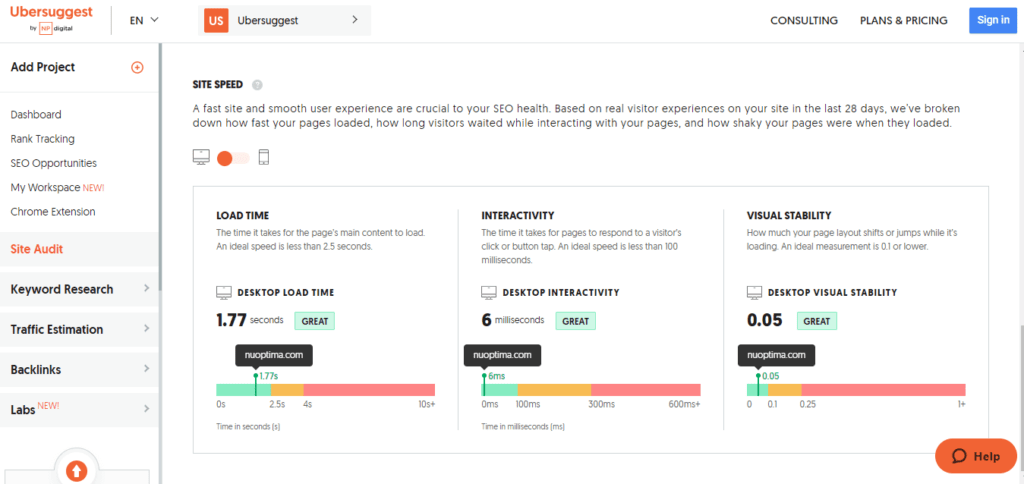
Just remember: a healthy website not only improves user experience but also signals to search engines that your site is well-maintained and deserves a higher ranking. So, adapt your SEO strategy based on your findings and make data-driven decisions to continuously improve your website’s performance.
Pro-Tip: Use website analytics tools like Google Analytics and set up Google Search Console to track your healthcare SEO progress. Monitor key metrics like organic traffic, user engagement, and conversions (patient appointment bookings or patient forms filled). Analyze your data to identify what’s working and what’s not. Use website speed testing tools like PageSpeed Insights to identify areas for improvement and optimize your website for faster loading times.
13. Regularly Update Your Google My Business (GMB) Profile
Now that you have done everything to optimize your website, you are all set to create and optimize your Google My Business (GMB) profile. Your GMB profile includes accurate and up-to-date information like your address, phone number, and business operating hours.
When a user performs a location-based search such as “knee replacement in California,” Google pulls relevant clinics in and around this location as GMB profiles.
Hence, pay special attention to your GMB profile. Regularly updating your profile with fresh content, including photos, special offers, and patient reviews, is a good start. A well-maintained GMB profile increases your local visibility and makes it easier for potential patients to find you online.
Pro-Tip: Did you know that 48% of healthcare websites have basic mistakes with their websites? (Digitalis Medical) This causes 71% of patients to leave the website and go search for another provider (Digitalis Medical). So, schedule recurring reminders to update your GMB profile with fresh and updated content. Respond to patient questions and reviews promptly to demonstrate patient engagement and build trust.
14. Encourage Your Patients to Leave GMB Reviews
Since Google correlates the keywords in a review with what you do, focus on getting quality and SEO-friendly reviews. Gradually, this is going to add up to the healthcare SEO you have done for your website.
Here is what a typical Google search query session for ‘knee replacements in California’ would look like. See how the top-rated clinic with the most reviews shows up in the first place? This is why you should always encourage your patients to leave one.
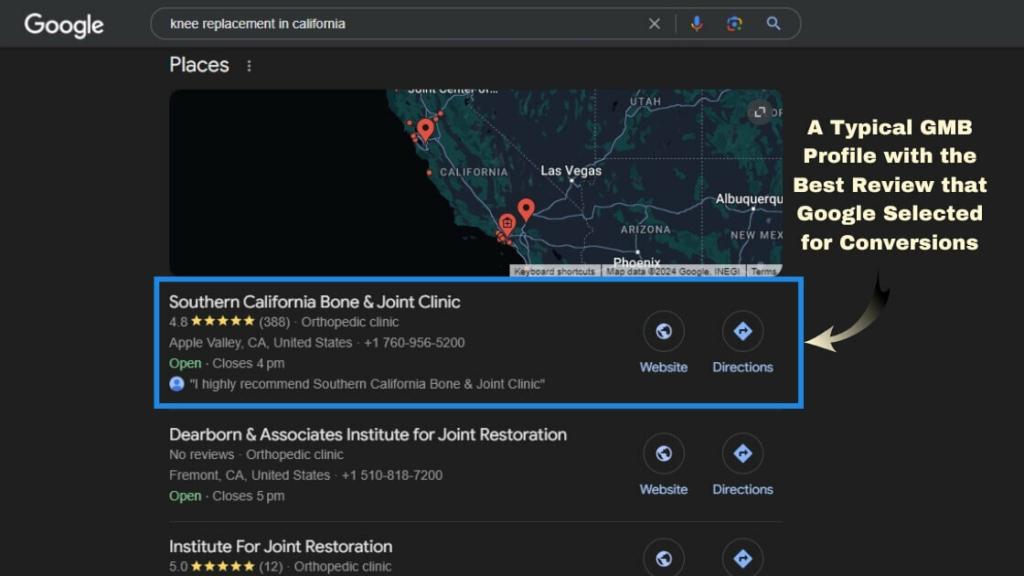
Pro-Tip: Never add fake clinic reviews in your GMB profile—this may work for other non-healthcare businesses, but it is quite easy to pick the odd ones out in the medical sector.
15. Finally, it is Local SEO That Gets You More Patients
In the end, you need to understand that healthcare SEO is more local than international. Because patients looking for treatment often search by adding the phrase ‘near me’ after any treatment they are looking for, say ‘hair transplant specialist near me’.
While it is important to maintain a good international standing in the healthcare sector, it will be local SEO that will get you more clients. After all, a person searching from London, UK, would consider a local specialist rather than one from Barcelona, Spain, right?
Picture it this way:
- A good international SEO accompanied by high-quality content from experts helps Google recognize your website with high EEAT, thereby ranking it higher in the SERPs.
This ensures your website attracts a significant volume of monthly visitors which Google takes as a sign of successful web sessions.
All of these 14 healthcare SEO tips until now were just to help you reach page 1 of the SERPs (or somewhere close). Now that you are here, you will have no problem getting patients once you start to implement a local SEO strategy.
- A good healthcare local SEO strategy would target patients searching for local terms, i.e., such and such treatment near me, near some city, inside of it, or at a particular location.
Pro-Tip: Google always prefers to show businesses in the user’s current location to make the search more personalized. Create a separate city and/ or service page for each of the locations where you have a clinic. Optimize each of them with a single location-specific keyword. If you don’t have time, consider healthcare SEO services from the UK’s top SEO agency.
Now that you have the top 15 healthcare SEO tips in your backpack, it is time to showcase how you can bring these insights into action.
We will dissect our Success Story With Denver Dentures to demonstrate how we implement SEO for healthcare providers and boost patient volume above nominal.
Case Study: How NUOPTIMA Helped Denver Dentures Land a 6x Increase in Leads in Just 180 Days?
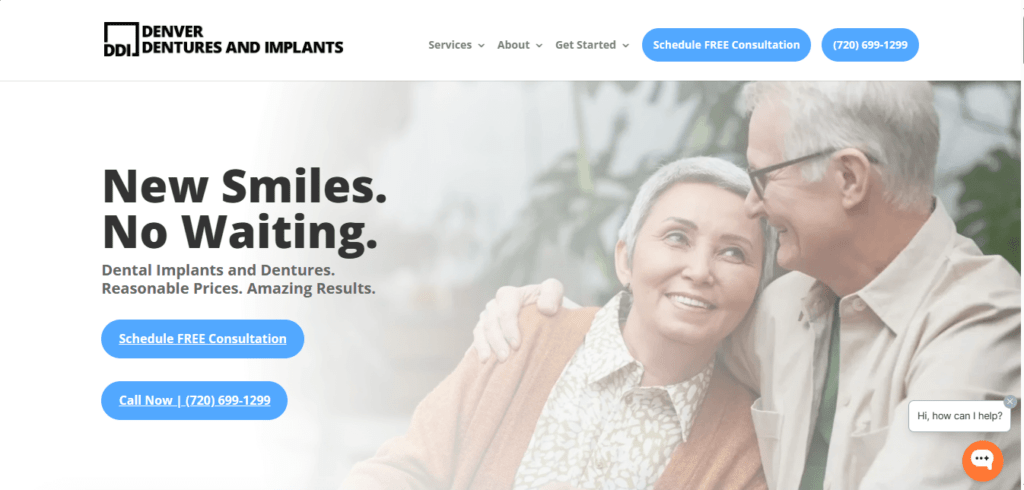
These friendly folks at Denver Dentures in Colorado hit a snag. Their website wasn’t even ranking for, well, “Denver Dentures.” Believe it or not, even that one was slipping to second place!
Also, before we collaborated with them, they were:
- Ranking for three keywords only
- Got an average of 161 clicks
- But almost none called them
They needed a boost in their online presence and wanted to score more happy patients.
Within just 180 days, we managed to deliver:
- 569.44% Increase in Scheduled Appointments
- 43.14% Increase in Calls
- Top 10 Positions for 32 Local Keywords
- Moved ‘Denver Dentures’ to Rank 1 in the SERPS
- 85.1 % Increase in Clicks and Average Search Position improved by 38.3%
- 333.33 Increase in Conversions on Desktop and 171.43% on Mobile
Quite expected, Denver Dentures started to get more clients and saw a very high ROI. But how in the world did we do it? In two words: healthcare SEO.
Here is how we implemented it.
How NUOPTIMA Implemented Healthcare SEO Strategy for Denver Dentures?
We began with an in-depth audit to identify technical issues and areas for improvement. Our strategy included:
- Identifying high-impact local keywords
- Creating 9,000 words of on-page content monthly
- Securing six monthly backlinks from high-authority sites
- Bi-weekly Technical Audits
- Monthly Reporting
Perhaps you are a dentist yourself, or are you working for a dental practice? Then, consider skimming the SEO for Dentists guide if you want SEO insights that drive traffic and conversion specifically in this specialty.
See? Healthcare SEO is All About Getting Found By the Right Patients
We mentioned healthcare SEO being trickier, right? That’s why Denver Dentures wasn’t converting their 150+ monthly clicks! Their site needed a makeover executed via an SEO framework—content, visibility, design, navigation, everything! Basically, it wasn’t turning lookers into loyal patients.
But why?
Because Healthcare SEO Was Never a One Man’s Job
Healthcare websites need SEO; however, adhering to strict regulations (remember EEAT and YMYL?) and keeping up with a busy practice can feel impossible. No wonder over 30% of providers lack local listings (according to Digitalis Medical), missing out on the 77% of patients searching online![1]
The Cure? Hire a healthcare SEO agency. They’ll boost your visibility, clicks, and new patient flow—without the SEO headache.
We Help Healthcare Providers Find Patients Who Need Them!
At NUPOPTIMA, we are obsessed with one thing: leaving your competition in the dust when it comes to search results. We are helping many healthcare providers day in and day out—Denver Dentures was just a start.
So if you want an increase in patient volume, we can always do the same for your practice, no matter your specialty.
The only question we ask is, will it be now? If yes, then let’s talk right away!
FAQ
Healthcare SEO is a systematic approach to optimizing a healthcare provider’s digital presence to get more organic traffic and convert site visitors into routine clients.
Doing SEO for a clinic is the same as doing SEO for any healthcare provider. Start by creating your clinic’s website, create content around the most appropriate keywords, engage in on-page and off-page activities, and optimize your site for page speed and user experience. Once you double-check that your clinic’s website is complete and you are ranking for enough local keywords, make use of a Google My Business Profile to convert patient clicks.
Medical SEO is the same as healthcare SEO and involves improving your medical site’s ranking in the search engines to help your patients find your practice.
The cost of medical SEO depends on many factors, such as deliverables, your budget, and how rigorous you want the process to be. But most commonly, medical SEO can cost anywhere between $3000 and $10,000 per month. Feel free to call our SEO experts at NUOPTIMA to match you with a plan that fits your budget and your needs.



